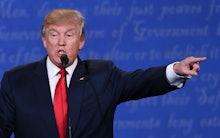The public has started to take sexual assault seriously -- but only when it's convenient

Since Donald Trump denied during the second presidential debate that he ever committed sexual assault, nearly a dozen women have accused him of unwanted physical advances. Despite the bevy of allegations against the GOP candidate — ranging from groping a stranger on an airplane to forcibly kissing a journalist — Trump has maintained that his accusers are lying, a claim he reiterated during his third and final faceoff with Hillary Clinton on Wednesday.
"Well, first of all, those stories have been largely debunked," Trump said of the allegations against him, which have not been debunked. "Those people, I don't know those people. I have a feeling how they came, I believe it was her [Hillary Clinton's] campaign."
But Trump doesn't seem to be convincing voters. According to a recent ABC/Washington Post poll, 7 in 10 Americans polled believe Trump did make unwanted sexual advances.
In other words, the public might finally be heeding feminists' call to believe victims by default. But is that because we've actually learned to listen to survivors? Or is it because these survivors might finally have the power to end Trump's campaign?
Among Trump's defectors and Democrats, the willingness to believe GOP standard-bearer accusers isn't necessarily the result of a grand societal shift toward taking sexual assault survivors at their word — it's also an issue of political expedience. Just as Trump's supporters have given credence to several women who have accused Bill Clinton of abusing them, progressives haven't had much difficulty being convinced the Republican candidate is culpable of sexual misconduct.
The real test is whether pols, pundits and the public are willing to speak out against their own.
The former president is the paradigmatic example. Clinton's legacy remains largely unscathed despite credible allegations that he abused women. Yet because left-leaning voters have long supported many of his policies — and because the accusations against him are being used against his wife in a high-stakes election — they retain a lingering skepticism about Juanita Broaddrick, who says Clinton raped her in the 1970s.
It is worth mentioning, as many Democrats have, that Bill is not the Clinton running for president in 2016; however, Broaddrick's allegations do implicate Hillary, who allegedly threatened the accuser to stay silent about her rape. Voting for Hillary has required her followers to interrogate what it means to believe and support sexual assault victims.
Or fail to. Leftists and feminists sided with the Clintons when Broaddrick and other accusers first went public in the 1990s.
"Women know that this is an unfair attack on Hillary, and that's why it continues to exist in this small corner of the right-wing media world," Marcy Stech, vice president of communications at Emily's List, said in a BuzzFeed profile of Broaddrick earlier this year.
Broaddrick's support for Trump has led some progressives to question her motives for reiterating her claims as the election heats up — why trade one abuser of women for another? But whom she supports for president has no bearing on whether she was, in fact, assaulted.
Liberals have displayed more willingness in recent years to reject their own politicians for unseemly sexual behavior — not just assault. Beleaguered Democrats Eliot Spitzer and Anthony Weiner were both shamed out of public life after their sexual misconduct were revealed. It wasn't immediate, though: After a stint at CNN in the wake of a prostitution scandal, the former finally receded in disgrace after facing allegations of sexual assault in February; in addition to being caught sexting repeatedly, the latter was accused of inappropriate behavior with a teenage girl.
A generous interpretation would suggest we've come to understand people in positions of power are capable of abusing it, and that they do abuse it often; this was, arguably, the lesson progressives and the broader public learned from the scores of women who accused Bill Cosby of rape and abuse.
With both Spitzer and Weiner, however, the public had more evidence to go by than women's words: We had social media and the internet — something more than the "he said, she said" allegations that continue to make the idea of believing victims contentious. The scale of the accusations made it impossible for much of the electorate to maintain cognitive dissonance.
The credence Trump's accusers have been given isn't just about him.
The difference between liberals' response to men like Bill Clinton and Spitzer does show some progress in how we respond to accusations of violence against those in charge. Perhaps social norms have changed enough to make sexual misconduct and the abuse of power (especially when it's used against women) disqualifying, at least on the left. But even as progressives have shown themselves more willing to engage allegations of sexual misconduct even when it hurts their political interests, it's still worth considering why they've been so eager to believe the accusations against Trump as his.
Maybe we finally have gotten somewhere as a country when it comes to understanding what it means to be a victim of sexual assault — why so many survivors stay silent, and why so many accusers deserve to be heard and believed. Or, maybe it's because Trump's accusers are playing the same role survivors have always played in politics: Their stories are weapons against politicians we either hope to vote for or hope to defeat. Whether we believe them depends on whether the accused is someone we believe in.